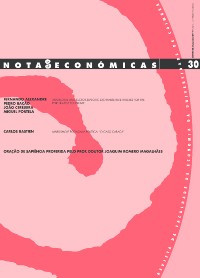Please use this identifier to cite or link to this item:
https://hdl.handle.net/10316.2/25215| DC Field | Value | Language |
|---|---|---|
| dc.contributor.author | Alexandre, Fernando | - |
| dc.contributor.author | Bação, Pedro | - |
| dc.contributor.author | Cerejeira, João | - |
| dc.contributor.author | Portela, Miguel | - |
| dc.date.accessioned | 2013-07-17T09:39:02Z | |
| dc.date.accessioned | 2020-10-04T14:49:05Z | - |
| dc.date.available | 2013-07-17T09:39:02Z | |
| dc.date.available | 2020-10-04T14:49:05Z | - |
| dc.date.issued | 2009 | - |
| dc.identifier.issn | 2183-203X | - |
| dc.identifier.uri | https://hdl.handle.net/10316.2/25215 | - |
| dc.description.abstract | Neste texto apresentamos índices da taxa de câmbio efectiva, agregados e por sector, para a economia portuguesa. Os vários índices apresentados são semelhantes entre si, estando os índices sectoriais fortemente correlacionados com os índices agregados. Contudo, os índices sectoriais são mais informativos que os agregados: enquanto os índices agregados não são significativos em regressões do emprego sectorial, os índices sectoriais são significativos e revelam a existência de um efeito importante da taxa de juro sobre o emprego. | por |
| dc.description.abstract | Dans ce texte on présente des indices de taux de change effectif, agrégés et sectoriels, pour l'économie portugaise. Les indices sont semblables entre eux, de façon que la corrélation entre les indices sectoriels et les indices agrégés est très forte. Cependant, les indices sectoriels sont plus informatifs que les indices agrégés: tandis que les indices agrégés ne sont pas significatifs dans les régressions pour l'emploi, les indices sectoriels sont significatifs et, en plus, leurs coefficients montrent que la taux de change a un effet important sur l'emploi. | fra |
| dc.description.abstract | In this paper, we compute and compare aggregate and sector-specific exchange rate indexes for the Portuguese economy. We find that alternative effective exchange rate indexes are very similar between them. We also find that sector-specific effective exchange rates are strongly correlated with aggregate indexes. Nevertheless, we show that sector-specific exchange rates are more informative than aggregate exchange rates in explaining changes in employment: whereas aggregate indexes are statistically insignificant in employment equations, regressions using sector-specific exchange rate indexes show a statistically significant and economically large effect of exchange rates on employment. | eng |
| dc.language.iso | eng | - |
| dc.publisher | Faculdade de Economia da Universidade de Coimbra | - |
| dc.title | Aggregate and Sector-Specific Exchange Rate Indexes for the Portuguese Economy | por |
| dc.type | article | - |
| uc.publication.collection | Notas Económicas nº 30 | - |
| uc.publication.firstPage | 6 | - |
| uc.publication.issue | 30 | - |
| uc.publication.lastPage | 28 | - |
| uc.publication.location | Coimbra | - |
| uc.publication.journalTitle | Notas Económicas | - |
| dc.identifier.doi | 10.14195/2183-203X_30_1 | - |
| uc.publication.section | Artigos | - |
| uc.publication.orderno | 2 | - |
| uc.publication.area | Ciências Sociais | - |
| uc.publication.manifest | https://dl.uc.pt/json/iiif/10316.2/25215/267011/manifest?manifest=/json/iiif/10316.2/25215/267011/manifest | - |
| uc.publication.thumbnail | https://dl.uc.pt/retrieve/12123434 | - |
| item.grantfulltext | open | - |
| item.fulltext | With Fulltext | - |
| Appears in Collections: | Notas Económicas | |
Files in This Item:
| File | Description | Size | Format | |
|---|---|---|---|---|
| notaseconomicas30_artigo1.pdf | 552.68 kB | Adobe PDF |  |
Items in DSpace are protected by copyright, with all rights reserved, unless otherwise indicated.
